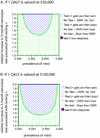When is pharmacogenetic testing for antidepressant response ready for the clinic? A cost-effectiveness analysis based on data from the STAR*D study
- PMID: 19494805
- PMCID: PMC3312011
- DOI: 10.1038/npp.2009.50
When is pharmacogenetic testing for antidepressant response ready for the clinic? A cost-effectiveness analysis based on data from the STAR*D study
Abstract
The potential of personalized medicine to transform the treatment of mood disorders has been widely touted in psychiatry, but has not been quantified. We estimated the costs and benefits of a putative pharmacogenetic test for antidepressant response in the treatment of major depressive disorder (MDD) from the societal perspective. Specifically, we performed cost-effectiveness analyses using state-transition probability models incorporating probabilities from the multicenter STAR*D effectiveness study of MDD. Costs and quality-adjusted life years (QALYs) were compared for sequential antidepressant trials, with or without guidance from a pharmacogenetic test for differential response to selective serotonin reuptake inhibitors (SSRIs). Likely SSRI responders received an SSRI, whereas likely nonresponders received the norepinephrine/dopamine reuptake inhibitor bupropion. For a 40-year old with MDD, applying the pharmacogenetic test and using the non-SSRI bupropion for those at higher risk for nonresponse cost $93,520 per additional QALY compared with treating all patients with an SSRI first and switching sequentially in the case of nonremission. Cost per QALY dropped below $50,000 for tests with remission rate ratios as low as 1.5, corresponding to odds ratios approximately 1.8-2.0. Tests for differential antidepressant response could thus become cost effective under certain circumstances. These circumstances, particularly availability of alternative treatment strategies and test effect sizes, can be estimated and should be considered before these tests are broadly applied in clinical settings.
Figures


Similar articles
-
Developing thai economic model to study cost-effectiveness of switching to bupropion compared to combination with bupropion after the failure of an SSRI for major depressive disorder.J Med Assoc Thai. 2010 Nov;93 Suppl 6:S35-42. J Med Assoc Thai. 2010. PMID: 21284135 Clinical Trial.
-
Pharmacy and medical costs associated with switching between venlafaxine and SSRI antidepressant therapy for the treatment of major depressive disorder.J Manag Care Pharm. 2008 Jun;14(5):426-41. doi: 10.18553/jmcp.2008.14.5.426. J Manag Care Pharm. 2008. PMID: 18597572 Free PMC article.
-
Economic impact of therapeutic substitution of a brand selective serotonin reuptake inhibitor with an alternative generic selective serotonin reuptake inhibitor in patients with major depressive disorder.Ann Pharmacother. 2011 Apr;45(4):441-51. doi: 10.1345/aph.1P482. Epub 2011 Mar 17. Ann Pharmacother. 2011. PMID: 21415162
-
Multi-gene Pharmacogenomic Testing That Includes Decision-Support Tools to Guide Medication Selection for Major Depression: A Health Technology Assessment.Ont Health Technol Assess Ser. 2021 Aug 12;21(13):1-214. eCollection 2021. Ont Health Technol Assess Ser. 2021. PMID: 34484487 Free PMC article.
-
The Clinical and Cost Effectiveness of Vortioxetine for the Treatment of a Major Depressive Episode in Patients With Failed Prior Antidepressant Therapy: A Critique of the Evidence.Pharmacoeconomics. 2016 Sep;34(9):901-12. doi: 10.1007/s40273-016-0417-9. Pharmacoeconomics. 2016. PMID: 27289476 Review.
Cited by
-
Cost-effectiveness of one-time genetic testing to minimize lifetime adverse drug reactions.Pharmacogenomics J. 2016 Apr;16(2):129-36. doi: 10.1038/tpj.2015.39. Epub 2015 May 19. Pharmacogenomics J. 2016. PMID: 25987241
-
A new paradigm for the prediction of antidepressant treatment response.Dialogues Clin Neurosci. 2009;11(4):435-46. doi: 10.31887/DCNS.2009.11.4/afleuchter. Dialogues Clin Neurosci. 2009. PMID: 20135901 Free PMC article.
-
Pharmacogenomics of Antidepressant and Antipsychotic Treatment: How Far Have We Got and Where Are We Going?Front Psychiatry. 2020 Mar 12;11:94. doi: 10.3389/fpsyt.2020.00094. eCollection 2020. Front Psychiatry. 2020. PMID: 32226396 Free PMC article. Review.
-
The estimation of utility weights in cost-utility analysis for mental disorders: a systematic review.Pharmacoeconomics. 2013 Dec;31(12):1131-54. doi: 10.1007/s40273-013-0107-9. Pharmacoeconomics. 2013. PMID: 24293216
-
Abandoning personalization to get to precision in the pharmacotherapy of depression.World Psychiatry. 2016 Oct;15(3):228-235. doi: 10.1002/wps.20345. World Psychiatry. 2016. PMID: 27717262 Free PMC article.
References
-
- The International HapMap Project. Nature. 2003;426:789–796. - PubMed
-
- Anonymous . Drug Topics Red Book. 108th Ed. Montvale, NJ: Medical Economics; 2006.
-
- Arias E. United States Life Tables. Hyattsville, MD: National Center for Health Statistics; 2004. - PubMed
-
- Bennett KJ, Torrance GW, Boyle MH, Guscott R, Moran LA. Development and testing of a utility measure for major, unipolar depression (McSad) Qual Life Res. 2000;9:109–120. - PubMed
-
- Center UDoVAHER
Publication types
MeSH terms
Substances
Grants and funding
LinkOut - more resources
Full Text Sources
Medical

